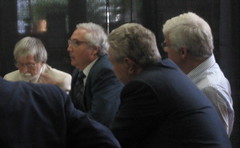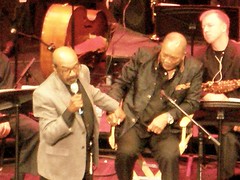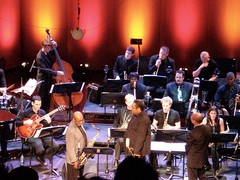One hour is not nearly enough time to delve into the topic of George Soros’ latest book, “The Age of Fallibility: Consequences of the War on Terror“, but in the presence of a world-class panel, today’s lunchtime discussion / book-signing at the Annenberg School for Communication was still a memorable treat.


(l-r): 1) Geoffrey Cowan, George Soros. 2) Robert Scheer, Manuel Castells, Cowan, Soros
The main points Soros touched upon in a somewhat toned-down description of the book are worth devoting hours of debate and study to. With a nod to his philosophical mentor (from his days at the London School of Economics), Karl Popper, Soros explained that America’s leaders are misleading society by misperceiving and manipulating reality. “We are bound to be wrong,” and one must understand that you can’t change reality itself, but only the way in which you deal with it. He drew comparisons to Marxism and the Enlightenment, before bringing it home to the war on terror.
The prolific writer, professor, and Wallis Annenberg Chair of Technology and Communication, Manuel Castells set the table with this 3-pronged question: What is the “fertile fallacy” Soros writes of; what is wrong with American society in the eyes of the world? How has it become more a matter of — not who is president — but more profoundly how U.S. leaders envision and execute America’s role in the world?; and what is wrong with American society’s relationship with the media — how does the business of media, and the emergence of blogs and the Internet affect this?
“If you can manipulate reality why be so concerned about the truth,” Soros said, blaming the American public for not taking seriously the series of lies from the Bush Administration so seriously, when in fact, if people manipulate reality the outcome won’t correspond to expectations which lead to a pattern of “unintended adverse consequences.”
“When Bush says our will is being tested in Baghdad,” Soros said, “Its not our will — its our reality.” The more we persist, the bigger a hole we open up for ourselves.
In response to a question regarding last week’s reality-filled GOP revolt against Bush’s call for Congress to pass Geneva Convention-circumventing legislation and Colin Powell’s letter to the president and his cautionary statements this week, Soros was blunt.
“Terrorists kill innocents for politilcal goals. When America wages war, we also create innocent victims, so we’re perceived in the same light as terrorists. It may be difficult for us to understand. But its true.” Continue reading “George Soros Visits USC”





